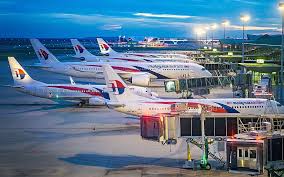Driving Cargo Connectivity Between Kuala Lumpur and Hong Kong
Malaysia and Hong Kong are setting their sights on bolstering cargo connectivity between two of Asia’s pivotal gateways, Kuala Lumpur International Airport (KLIA) and Hong Kong International Airport (HKIA), through a strategy known as the twin-hub model. This approach could dramatically improve the flow of goods, trade, and logistics services throughout the region.
The Twin-Hub Model: What It Means for Cargo Movement
The twin-hub strategy aims to leverage the unique strengths of both KLIA and HKIA, creating a synergistic network that enhances efficiency and capacity for cargo transport. By acting as complementary hubs rather than competitors, these airports can unlock greater potential for freight forwarding and international shipments.
Benefits of Strengthened Cargo Links
- Increased Freight Capacity: Enhancing cargo flows between the two airports can ease bottlenecks and support growing shipment volumes in the region.
- Improved Reliability: Coordinated scheduling and logistics operations may lead to quicker turnaround times and more dependable delivery schedules.
- Expanded Economic Cooperation: Closer cargo connectivity is a stepping stone toward deeper trade relationships and shared growth across multiple sectors.
Insights from High-Level Discussions
Discussions held recently between key transportation officials from both Malaysia and Hong Kong highlighted the commitment to deepening cooperation. The focus extended beyond cargo to include aviation and maritime sectors, pointing to a holistic approach to regional logistics improvements.
Moreover, sharing regulatory experiences, such as Malaysia’s approach to e-hailing industry governance, underlines the broader framework of economic and operational collaboration that complements the logistics discourse.
Why Kuala Lumpur and Hong Kong Are Strategic Cargo Gateways
Both KLIA and HKIA feature prominently not just as passenger hubs but as essential freight corridors. Here’s a snapshot of each’s strategic role:
| Airport | Focus | Capacity Highlights | Regional Importance |
|---|---|---|---|
| Kuala Lumpur International Airport (KLIA) | Major Southeast Asian cargo hub | Equipped with extensive runway capabilities to handle large aircraft and increasing cargo volumes | Serves as Malaysia’s central logistics gateway, supporting high-tech industries and export trade |
| Hong Kong International Airport (HKIA) | One of the world’s busiest cargo airports | Exports and re-exports facilitation with expansive cargo terminals and connectivity | Key logistics node linking Asia-Pacific markets with global destinations |
Regional Logistics Impact and Opportunities
Stronger cargo links between KLIA and HKIA don’t merely support local or bilateral trade; they play into the larger dynamics of international freight and distribution networks. By increasing capacity and reducing redundancies, such connectivity can streamline haulage and forwarding paths that cross borders, bring down shipping times, and cut costs.
For industries that rely on timely and reliable delivery—be it electronics, automotive parts, or perishable goods—this twin-hub collaboration spells opportunities to smooth out container flows and reduce logistical stress.
Not Just Cargo: Insights Into Broader Transport Trends
The talks also included sharing of regulatory expertise, especially in new and disruptive transport sectors like e-hailing, demonstrating a forward-looking approach. Such cross-sector collaboration often trickles down to create smarter, more integrated logistics ecosystems where couriers, movers, and dispatch services benefit from harmonized frameworks.
Looking Ahead: The Future of Twin-Hub Cargo Networks
The potential laid out by combining KLIA and HKIA as a twin-hub cargo network could signal a new era for freight transport links in Southeast Asia. If successful, this model might inspire further partnerships across the globe, emphasizing collaboration over competition in international logistics hubs.
Major Advantages to Logistics Players
- Reduced transit times and risks in parcel and pallet shipping
- Enhanced capacity for bulky and large-scale shipments including containers
- More cost-effective forwarding options leveraging combined airport strengths
Experience vs Reviews: Why Hands-On Cargo Transport Matters
While reports and reviews provide helpful perspectives on such developments, nothing quite beats real-world experience. The nuanced demands of relocation, heavy goods delivery, or time-sensitive shipments make firsthand logistics management irreplaceable.
Platforms like GetTransport.com offer global, affordable, and reliable transport solutions that empower customers to try out such routes and services firsthand, ensuring they choose what fits their needs best without empty promises. With its flexibility in handling everything from office moves to vehicle transportation, GetTransport.com embodies the very essence of logistics innovation discussed here. Book your Ride at GetTransport.com and take advantage of tailor-made freight and shipment options worldwide.
Global Logistics Impact and Final Thoughts
While this strengthened cargo connectivity may not revolutionize the global logistics landscape overnight, it certainly spotlights the increasing importance of regional hubs working in tandem. Enhancing the efficiency of cargo flow between Kuala Lumpur and Hong Kong serves as a microcosm for smarter shipping and distribution strategies worldwide.
At a time when the international freight landscape is evolving rapidly, GetTransport.com’s commitment to staying on top of such developments ensures that users enjoy the most up-to-date service benefits. Start planning your next delivery and secure your cargo with the flexibility and convenience offered by GetTransport.com.
Summary
The cooperation between Kuala Lumpur and Hong Kong to develop cargo connectivity through a twin-hub model presents exciting prospects for freight transport and logistics sectors. By combining the strengths of KLIA and HKIA, this initiative aims to deliver a more reliable, higher-capacity, and cost-effective corridor for international shipments. The ripple effects could benefit not just regional trade but global forwarding and distribution activities. In line with these emerging trends, platforms like GetTransport.com simplify the complex world of logistics by offering competitive, transparent, and convenient freight services globally, catering efficiently to varied shipment and relocation needs.

